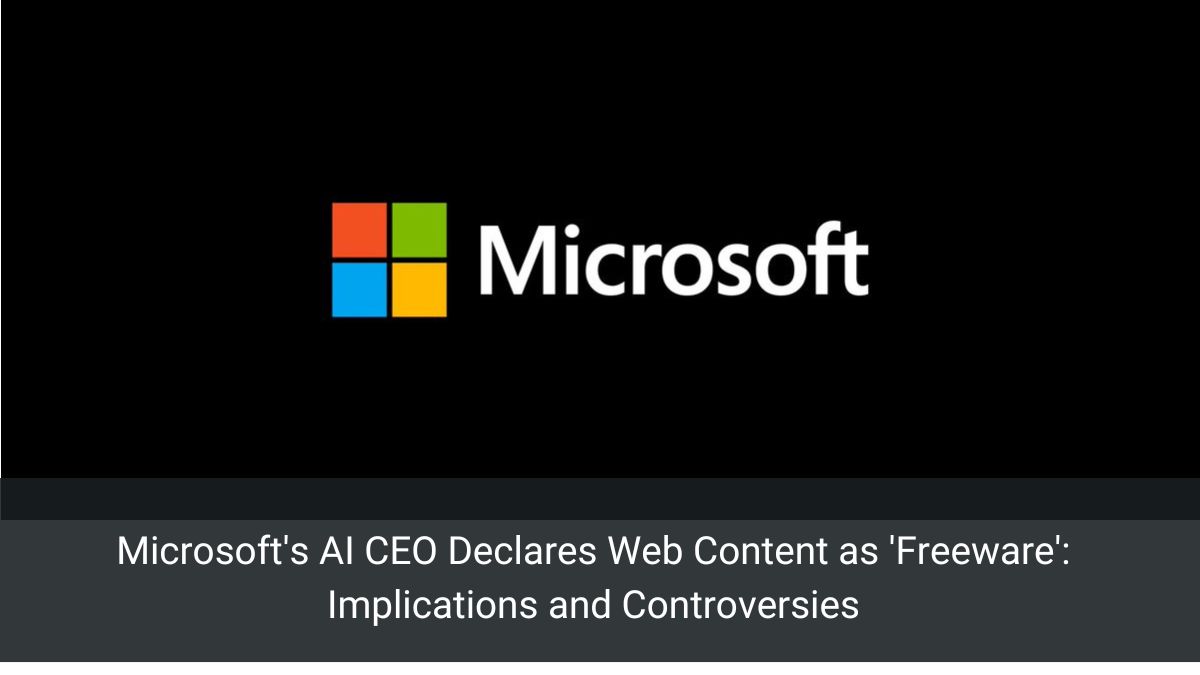AI
Microsoft’s AI CEO Declares Web Content as ‘Freeware’: Implications and Controversies

Microsoft’s AI CEO, Mustafa Suleyman, recently stirred the pot with a provocative statement about web content. He declared that most web content is essentially “freeware” that can be utilized for training AI models, with exceptions only for websites that explicitly opt out. This statement, made at the Aspen Ideas Festival, has sparked considerable debate about the ethics and legality of using online content for AI training. In this article, we will explore the nuances of Suleyman’s claim, the concept of freeware, the implications for content creators, and the broader legal and ethical landscape.
Understanding the Concept of Freeware
Definition and Historical Context
Freeware refers to any copyrighted software that can be freely downloaded, installed, and used by end users. This term has traditionally been associated with software, but Suleyman’s application of it to web content marks a significant shift in its usage. Historically, freeware has been a way for developers to distribute software without charge, often to build a user base or to support open-source projects.
Suleyman’s Interpretation
In his conversation with CNBC’s Andrew Ross Sorkin, Suleyman explained that content on the open web has been treated as fair use since the 1990s. He argued that there has been an implicit “social contract” allowing anyone to copy, recreate, and reproduce web content. According to Suleyman, this understanding renders most web content as freeware, accessible for training AI models unless a website explicitly states otherwise.
The Legal and Ethical Dimensions
Fair Use vs. Copyright Infringement
Fair use is a legal doctrine that allows limited use of copyrighted material without permission from the rights holders. It covers activities such as criticism, commentary, news reporting, teaching, and research. However, the use of web content to train AI models often extends beyond these traditional boundaries. AI companies, including Microsoft and Google, are leveraging this content to develop profitable technologies, which raises questions about whether this practice constitutes fair use or copyright infringement.
The Absence of a Social Contract
Critics argue that there is no universally accepted “social contract” permitting unrestricted use of web content for AI training. The notion benefits large tech corporations but often overlooks the rights and interests of content creators. Many publishers and website owners may not be aware that their content is being used in this manner, leading to concerns about consent and compensation.
The Impact on Content Creators
Loss of Control and Potential Revenue
Content creators invest significant time and resources into producing valuable online content. When this content is used without permission for AI training, creators lose control over how their work is utilized. Furthermore, they miss out on potential revenue streams, as AI companies profit from their labor without providing compensation.
Legal Challenges and Licensing Agreements
In response to these concerns, several legal challenges have been mounted against AI companies. These lawsuits aim to clarify the boundaries of fair use and protect the rights of content creators. Additionally, companies like OpenAI have begun signing content licensing deals to mitigate legal risks and ensure that creators receive appropriate compensation for their work.
Broader Implications for the AI Industry
Ethical Considerations
The ethical implications of using web content for AI training are significant. Beyond the legal aspects, there are questions about the fairness and transparency of these practices. Should AI companies be more forthcoming about how they source their training data? Should there be more stringent regulations to protect the interests of content creators?
The Future of AI Development
As AI technology continues to advance, the need for vast amounts of training data will only increase. This demand will likely lead to more scrutiny and regulation of how data is sourced and used. The industry must navigate these challenges carefully to maintain public trust and ensure that AI development is both ethical and sustainable.
Personal Reflections and Examples
My Encounter with Content Scraping
As a content creator myself, I’ve had my work scraped and used without permission on multiple occasions. It’s frustrating to see your hard work repurposed without credit or compensation. This experience has made me acutely aware of the potential downsides of Suleyman’s perspective on web content as freeware.
Anecdotal Evidence from Peers
Many of my colleagues in the content creation community share similar stories. They are concerned about the implications of their work being used to train AI models without their consent. These anecdotes highlight the need for clearer guidelines and protections for content creators in the evolving digital landscape.
Mustafa Suleyman’s assertion that most web content is “freeware” for AI training has sparked a heated debate about the ethics and legality of using online content without explicit permission. While the concept of freeware has historical roots in software distribution, its application to web content raises complex legal and ethical questions.
As the AI industry continues to grow, it is crucial to strike a balance between technological advancement and the rights of content creators. Legal challenges and licensing agreements will play a vital role in shaping this landscape, ensuring that creators are fairly compensated and that their work is used responsibly.
In conclusion, the future of AI development hinges on navigating these ethical and legal challenges with transparency and integrity. Content creators, legal experts, and tech companies must collaborate to establish fair practices that respect the contributions of all stakeholders. As we move forward, it is essential to foster an environment where innovation can thrive without compromising the rights and interests of those who fuel it with their creativity and hard work.
